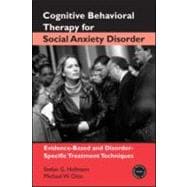
Note: Supplemental materials are not guaranteed with Rental or Used book purchases.
Purchase Benefits
What is included with this book?
| Preface | p. xi |
| Acknowledgments | p. xiii |
| Characterizing Social Anxiety Disorder | p. 1 |
| What is Social Anxiety Disorder? | p. 2 |
| Diagnostic Criteria for SAD | p. 4 |
| Disorder Prevalence and Characteristics | p. 6 |
| Information Processing in SAD | p. 13 |
| Etiology of SAD | p. 15 |
| Assessment of Social Anxiety and SAD | p. 18 |
| Contemporary Psychological Treatments | p. 20 |
| Pharmacological Treatments | p. 25 |
| Combined Pharmacotherapy and CBT | p. 29 |
| Overall Description of Treatment Strategy | p. 31 |
| Just Do It! | p. 31 |
| The General Treatment Model | p. 33 |
| The Elements of the Treatment Model | p. 34 |
| Putting It All Together: Designing Exposures | p. 50 |
| Session-by-Session Outline | p. 53 |
| General Outline | p. 54 |
| Session 1 | p. 55 |
| Session 2 | p. 69 |
| Sessions 3-6 | p. 74 |
| Session 7-End | p. 75 |
| Last Session | p. 76 |
| Research Basis for the Treatment Model | p. 77 |
| Social Standards | p. 78 |
| Goal Setting | p. 78 |
| Self-Focused Attention | p. 79 |
| Self-Perception | p. 80 |
| Estimated Social Cost | p. 82 |
| Perception of Emotional Control | p. 84 |
| Perceived Social Skills | p. 86 |
| Safety and Avoidance Behaviors | p. 88 |
| Post-Event Rumination | p. 89 |
| Summary | p. 90 |
| Treatment in Action: Clinical Examples | p. 91 |
| Preparation for Exposures | p. 94 |
| Early In-Session Exposures With Attention Training | p. 96 |
| PostExposure Discussion | p. 98 |
| Viewing Videotaped Exposures | p. 101 |
| Home Practice Exposures | p. 105 |
| Later In-Session Exposure | p. 107 |
| In Vivo Social Mishap Exposures | p. 110 |
| Complicating Factors | p. 115 |
| Intrusive and Self-Deprecating Thoughts | p. 115 |
| Hostility and Paranoia | p. 118 |
| Depression and SAD | p. 120 |
| Substance Abuse and SAD | p. 125 |
| Troubleshooting: NonResponse | p. 127 |
| Troubleshooting: Poor Adherence | p. 130 |
| Combination Treatment With Medication and CBT | p. 133 |
| Maintenance and Follow-Up Strategies | p. 137 |
| Generalizing Treatment Skills | p. 138 |
| Additional Relapse Prevention Skills | p. 141 |
| Closing Treatment: Attending to Well-being | p. 144 |
| Booster Sessions | p. 145 |
| References | p. 147 |
| Handout 1: A CBT Model of Social Anxiety Disorder | p. 175 |
| Handout 2: Learning Objectives | p. 177 |
| Handout 3: Approach to Social Situations Scale | p. 179 |
| Handout 4: Daily Record of Social Situations (DRSS) | p. 181 |
| Instructions on how to complete the Daily Record of Social Situations (DRSS) | p. 181 |
| Handout 5: Cognitive Preparation for Video Feedback | p. 183 |
| Prediction of Social Performance | p. 183 |
| Imagination of Social Performance | p. 184 |
| Identifying and Challenging Incorrect Predictions | p. 185 |
| Self-Defeating Thoughts | p. 187 |
| Worksheet for Challenging Automatic Thoughts | p. 189 |
| Fear and Avoidance Hierarchy | p. 191 |
| Social Fear Worksheet for Exposure Planning | p. 193 |
| The Maintaining Variables of Social Anxiety | p. 197 |
| The Vicious Cycle Model of Avoidance | p. 197 |
| Anxiety Episode With Avoidance | p. 198 |
| Anxiety Episode Without Avoidance | p. 198 |
| Anxiety After Repeated Exposure to the Same Situation | p. 199 |
| Examples of In Vivo Exposure Tasks to Challenge Estimated Social Cost | p. 201 |
| Booster Worksheet for Exposure Planning | p. 203 |
| Author Index | p. 205 |
| Subject Index | p. 211 |
| Table of Contents provided by Ingram. All Rights Reserved. |
The New copy of this book will include any supplemental materials advertised. Please check the title of the book to determine if it should include any access cards, study guides, lab manuals, CDs, etc.
The Used, Rental and eBook copies of this book are not guaranteed to include any supplemental materials. Typically, only the book itself is included. This is true even if the title states it includes any access cards, study guides, lab manuals, CDs, etc.